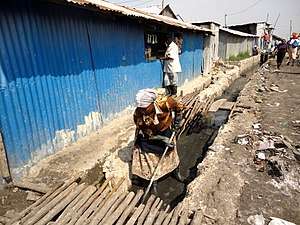Mukuru kwa Njenga
Mukuru kwa Njenga is a slum in the East of Nairobi, the capital of Kenya. It belongs to Embakasi south Constituency, but extends into Makadara and Starehe constituencies. It is one of the largest slums in Nairobi. It stretches along the Nairobi Ngong river, situated on waste lands in the industrial area of the city between the Outer Ring Road and the North Airport Road and mombasa road. Mukuru has villages: Mukuru kwa Reuben, Mukuru kwa Njenga, Sinai, Paradise, Jamaica, Kingstone, Mariguini, Fuata Nyayo and Kayaba. The population of the slum exceeds 100,000.[1]

.jpg)
Kenyan international footballer Patrick Oboya was born in Mukuru kwa Njenga. DJ Peter Adams one of the most famous DJ who had a very big career on KTN and Radio Maisha was born and raised in Mukuru kwa Reuben. Shabu Mwangi and Adam Masava are one of the Kenya fine artists who have exhibited all over the world. Adam Masava has raised kids who have participated and won in various fine arts competition including Toyota arts project. U-Tena arts group has been making a change in Mukuru and have gotten to perform in multiple events all over the world and in Kenya. Micato safaris has also been touching hearts of Mukuru kwa Njenga residents by offering scholarships to needy children, built a library for students within Mukuru, Water project and many more projects[2].We also have organisations like SHOFCO which also try to improve the lives of mukuru residents. Among other major slums in Nairobi are Korogocho, Kibera and Mathare.
Living conditions
Mukuru slums as any other slum in the world has been faced by different challenges including crime, drug abuse, prostitution and other challenges that face slums all over the world, but the people of Mukuru have been able to continuously fight this challenges and this has enabled many improvement in the community. In the slums, whole families live, or at least survive, in tiny one-roomed corrugated iron shacks, measuring approximately 3 m x 3 m. Very few homes have electricity and up to twenty families might share a communal water tap and toilet latrine.
Details
The Kwa Njenga Primary School exists there.[3] The Medical Missionary of Mary has a hospital there.[4] The Holy Ghost fathers have a big project and a catholic Church.There have been cholera deaths in 2009.[5] Mukuru kwa Njenga has Anglican churches.[6] Residents of the slum have been in fear of a mass eviction of more than 50,000 persons in 2002.[7]
Settlement profiling
The settlement profiling process include identifying the stakeholders, organizing of stakeholder forums for good representation, community mobilisation and awareness creation, training of data collectors, and focus group discussions and interviews.
The field research was conducted in 6 designated survey areas below:
Riara (SEPU) within the wider Mukuru kwa Njenga Mukuru Kwa Ruben Mukuru Kwa Njenga Viwandani Kiandutu( Thika, Kiambu County) Selected wards in Nairobi County that do not predominantly feature slums. The Mukura settlements have been designated as a Special Planning Area (SPA) due to their unique planning challenges and opportunities.
See also
References
- "InfoCatho". infocatho.cef.fr. Retrieved 2015-01-05.
- "Harambee Centre Library & Learning Resource Centre". Micato Safaris. Retrieved 2020-05-28.
- "Archived copy". Archived from the original on 2007-11-29. Retrieved 2009-11-24.CS1 maint: archived copy as title (link)
- "parishes makadara". kutokanet.com. Retrieved 2015-01-05.
- http://www.newstin.com/rel/us/en-010-019434289
- http://acknairobidiocese.org/index2.php?option=com_content&do_pdf=1&id=55%5B%5D
- https://books.google.com/books?as_q=&num=10&hl=en&btnG=Google-Suche&as_epq=Mukuru+kwa+Njenga%E2%80%8E&as_oq=&as_eq=&as_brr=0&as_pt=ALLTYPES&lr=&as_vt=&as_auth=&as_pub=&as_drrb_is=q&as_minm_is=0&as_miny_is=&as_maxm_is=0&as_maxy_is=&as_isbn=&as_issn=
